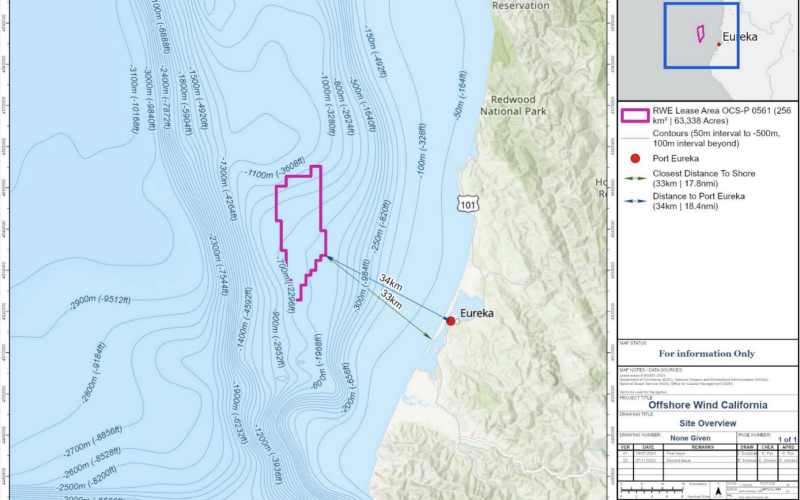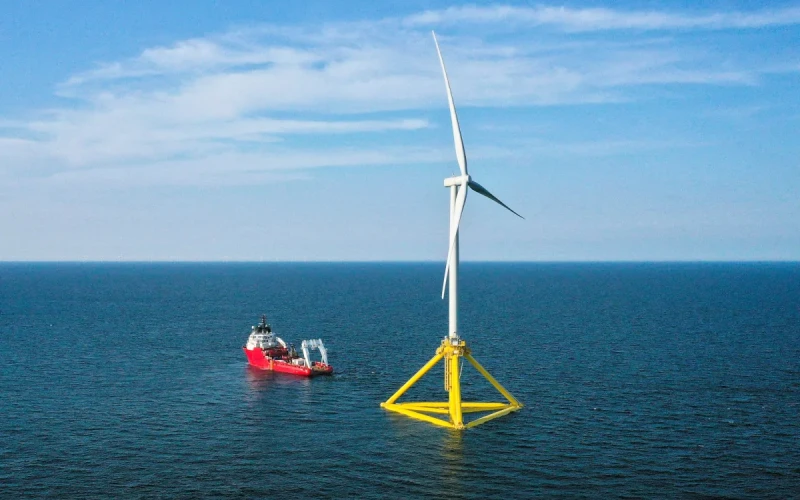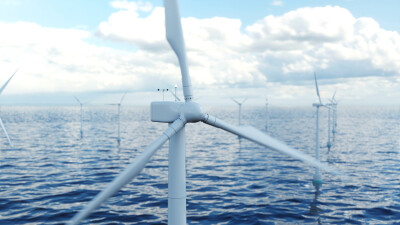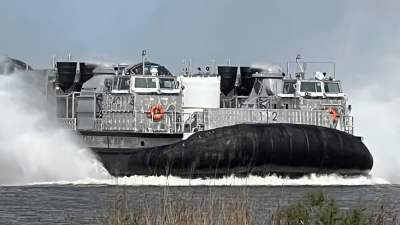Offshore wind developer RWE announced it will start site investigation surveys for its planed 1.6-gigawatt Canopy Offshore Wind Farm off northern California.
Located 20 miles off Humboldt County, the Canopy project would anchor floating wind turbines on a 63,338-acre lease RWE obtained in a 2022 auction by the federal Bureau of Ocean Energy Management.
"Surveying is an important step on the path toward developing Canopy Offshore Wind and helping provide clean energy that meets California’s ambitious climate goals,” said Sam Eaton, CEO of RWE Offshore Wind Holdings, in a June 12 statement. “RWE is committed to responsible, inclusive development by engaging Humboldt residents, Tribal Nations, and working closely with the fishing community as we begin offshore activities on the project.”
RWE selected subsea service provider Argeo to perform the Canopy site investigation work. "Argeo is pleased to partner with RWE on their first commercial scale floating offshore wind project. We will conduct subsea surveying utilizing proven, state-of-the-art technology," said Dave Gentle, vice president for North and South America at Argeo.
Argeo will utilize an autonomous underwater vehicle (AUV) to conduct surveys in the Humboldt lease area, where depths range from 500 to 1,100 meters (1,640 to 3,600 feet) according to BOEM.
“The use of an AUV as the survey platform during this initial site characterization effort will enable high-quality data collection close to the seafloor, including photographs of biological communities,” according to a summary by RWE.
Using the autonomous vehicle “significantly reduces the potential for entanglement of fishing gear as they are not towed equipment,” the company says. The sensors carried by the AUV operate at safe sound levels and meet California low energy equipment requirements for geophysical surveys that are in place to minimize impacts to marine mammals and other wildlife.”
Groups opposing offshore wind projects off the U.S. East Coast have worked to tie survey work to whale strandings and deaths. West Coast wind power is just entering that first phase of development, and RWE officials said they are planning to deploy protected species observers on survey vessels.

The company has engaged Geo SubSea and Coastal 35 Consulting to provide PSOs on survey vessels. Smultea Sciences will provide PSO training “to Tribal citizens and Humboldt County community members to increase the involvement and workforce opportunities for individuals who possess local and Indigenous knowledge of the area during the site investigation campaign,” according to RWE.
The first survey work is planned to start in June to map the seafloor and begin assessing best locations for turbines, anchors and cables, and charting habitat and environmental factors.
“Protected Species Observers are an essential part of ensuring site surveys occur safely in a way that avoids interactions with wildlife,” said Jeff Gardner, president of Geo SubSea, in a joint statement with RWE. “They are an important way to ensure offshore wind surveys are conducted in a manner that results in minimal disturbance to the marine ecosystem.”
“The role of the PSO is solely dedicated to monitoring for protected species,” said Jenn Klaib, owner of Coastal 35 Consulting. “PSOs work to enforce environmental regulations that protect marine wildlife and also provide valuable data for Canopy to better understand marine mammals, their habitats, behaviors, and migration routes.”
In April, Smultea Sciences trained 19 members of the local Humboldt and Tribal communities as Protected Species Observers. Several graduates of this program subsequently participated in Global Wind Organization safety training
“The Smultea Sciences team is pleased with the strong turnout of local CalPoly Humboldt and other students, local Tribal members, and community members attending and successfully completing our Marine Protected Species training,” said “It was very fulfilling to share our collective knowledge and experience in my hometown community and to open the door to work opportunities in the realms of marine biology and green energy development for Humboldt residents.”
RWE says its consultations with the northern California fishing industry “resulted in Canopy survey planning intended to avoid and minimize the potential for activity overlap, with activities sequenced in different areas during varying fishing seasons.”
The company is sending local commercial fishermen to Global Wind Organization safety training. Local fishing captains, identified by the area’s fishing industry, “will serve as an Onboard Fisheries Liaison (OFL) on the survey vessel to manage at-sea communication and coordination with the fishing fleet during survey activities,” the company says.





